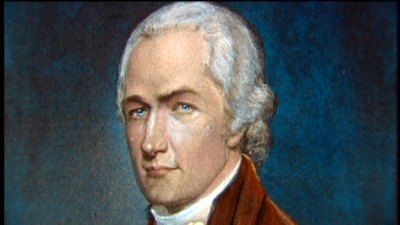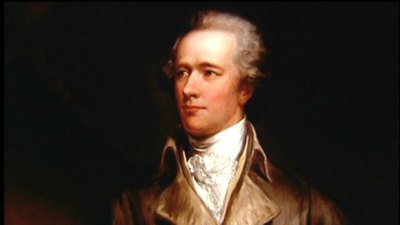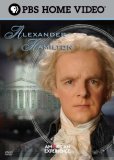| Reviews & Columns |
|
Reviews DVD TV on DVD Blu-ray 4K UHD International DVDs In Theaters Reviews by Studio Video Games Features Collector Series DVDs Easter Egg Database Interviews DVD Talk Radio Feature Articles Columns Anime Talk DVD Savant Horror DVDs The M.O.D. Squad Art House HD Talk Silent DVD
|
DVD Talk Forum |
|
|
| Resources |
|
DVD Price Search Customer Service #'s RCE Info Links |
|
Columns
|
|
|
Alexander Hamilton
An American Experience documentary from 2007, Alexander Hamilton is a handsomely produced, fascinating look at the Revolutionary War hero and Founding Father who very well may be the original architect of the "American Dream." Told with a combination of live-action recreations, interviews with historians and biographers, testimonials by actors reading original text and letters from the period, as well as copious original paintings and lithographs, Alexander Hamilton has a stately grace, a languid 18th century rhythm, if you will, that perfectly suits its subject matter. I found it most enlightening.

To be honest, before I put in the Alexander Hamilton disc, I'm not sure I would have passed even the most basic test on major events and accomplishments of Hamilton's short forty-nine year life. As the documentary makes very clear, this astonishingly accomplished Founding Father isn't the type of figure we Americans would necessarily venerate or celebrate with monuments or statues (no monument exists for him in Washington, D.C., according to the documentary). The documentary makes the point that Hamilton was the kind of statesman who not only dreamed great ideas - he enacted them. A superior statesman, he was, according to the documentary, a terrible politician, as well, and he made quite a few vehement enemies. The tragic flaws in his character; namely, an overriding desire for honor, ultimately cast Hamilton in a negative light, ending his life with the infamous deadly duel with arch-enemy Aaron Burr.
The historians featured in Alexander Hamilton, including Ron Chernow, Willard Sterne Randall, Karl F. Wallis, Thomas Fleming, Joanne Freeman, Richard Payne, Gordon S. Woods, and Carol Berkin, make the case that Hamilton was really the outsider among the Founding Fathers. Born illegitimate, when family and class were the main considerations in determining a man's worth, and later orphaned at an early age, Hamilton, self-fed on Greek classics, dreamed of attaining "fame" as it was understood in his age: the acts of great deeds that benefitted society. And through this fame, Hamilton perhaps hoped that his tortured childhood would recede for good. Coming to America from the West Indies, where he learned of the indignities of the slave trade first hand, Hamilton would wage war with several key opponents in his efforts to guide America into a true meritocracy, where a man's deeds and intelligence - and not solely his birthright - determined his ultimate worth.

Finding a political savior in President George Washington, who consistently backed up Hamilton and his ideas, Hamilton was able to sidestep the negative aspects of his failed political acumen (he was considered an arrogant snob; an elitist who rubbed almost everybody the wrong way) and still accomplish great deeds, including moving the country forward from a largely rural, agrarian society, onto a path based on international commerce and large-scale industry. His Federalist Party (he was one of the authors of the Federalist Papers, which remain the single most cited work in Supreme Court cases), which advocated big, powerful government to secure the wobbly, fledgling union of states into a unified nation, was the natural enemy of Thomas Jefferson, whose Republican Party advocated keeping America largely rural, with the citizen farmer the central voice of democracy. As Secretary of the Treasury under President Washington, Hamilton created "Assumption," which advocated the federal government assuming all state's debts associated with the Revolution, thereby giving confidence to our lenders that America was an honorable nation willing to pay off its obligations - as well as a reliable customer for more loans.
Hamilton's personal life, while happy with a successful marriage, was greatly marred by a foolish affair he had with Maria Reynolds (who later tried to blackmail Hamilton with her husband's help). When his love letters to Reynolds were going to go public, Hamilton, in a spectacular misjudgement based on misguided honor, took the foolish step of publishing them himself, further sullying his image, and greatly hurting his wife and family. His sense of honor and principle, without a tempering sense of self-survival, led him to attack his own party's president, John Adams, to defeat his second bid for Presidency; the vehemence of his attack backfired, leading to his own party's demise. And his single-minded attack on Aaron Burr's character led to the fatal duel that ended Hamilton's life.
Alexander Hamilton looks gorgeous, with careful cinematography by Tom Hurwitz, and tasteful direction by Muffie Meyer. There's nothing groundbreaking in Alexander Hamilton's approach to the standard historical documentary. With the filmed recreations of leading figures speaking directly to the camera (from authentic literature from that period), as well as the interviews with the various historians, Alexander Hamilton remains resolutely "talking heads" filmmaking. But with a subject as fascinating as Hamilton, and the professional manner in which Alexander Hamilton is executed, that's hardly a slight.

The DVD:
The Video:
The widescreen, 1.78:1 enhanced for 16x9 TVs video image for Alexander Hamilton is quite nice, with a glowing, soft-focus look to the recreations that contrasts nicely with the crisply shot historian interviews. Special mention should be made of the innovative use of large slide projections for the backgrounds of the various recreations, that simulate real-life (and prohibitively expensive) interiors.
The Audio:
The English stereo audio is excellent, with a clear, strong mix that perfectly captures the low-key line deliveries of the actors. Close-captioning is available.
The Extras:
There's an informative five minute Behind the Scenes featurette on the production of Alexander Hamilton, detailing the use of projection slides for backdrops. Short, less-than-a-minute or so deleted scenes are included also. They are: Alexander Hamilton's Widow Speaks; The Battle over the Establishment of a National Bank; Federalists vs. Republicans; Federalists and Republicans on Slavery; and Hamilton as Seen by his Contemporaries. They may be short, but they do add an additional context for the documentary, and are welcome for that.
Final Thoughts:
I've seen more than my fair share of these types of historical documentaries, but I was fascinated by Alexander Hamilton, a polished, professional look at our most forward-thinking Founding Father. This would make an excellent addition to classrooms covering this period in history, and I highly recommend Alexander Hamilton for anyone interested in learning more about this genius of the Revolution.
Paul Mavis is an internationally published film and television historian, a member of the Online Film Critics Society, and the author of The Espionage Filmography.


|
| Popular Reviews |
| Sponsored Links |
|
|
| Sponsored Links |
|
|
| Release List | Reviews | Shop | Newsletter | Forum | DVD Giveaways | Blu-Ray | Advertise |
|
Copyright 2024 DVDTalk.com All Rights Reserved. Legal Info, Privacy Policy, Terms of Use,
Manage Preferences,
Your Privacy Choices | |||||||













